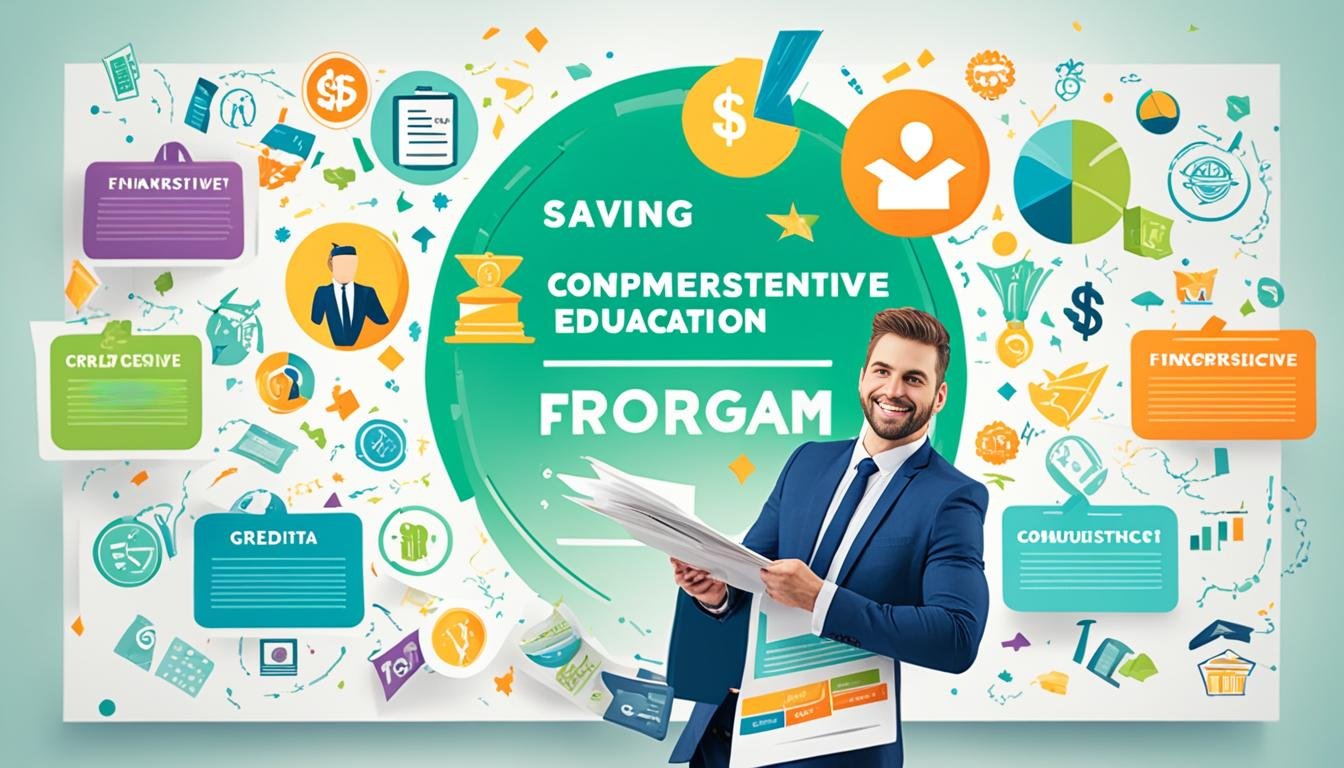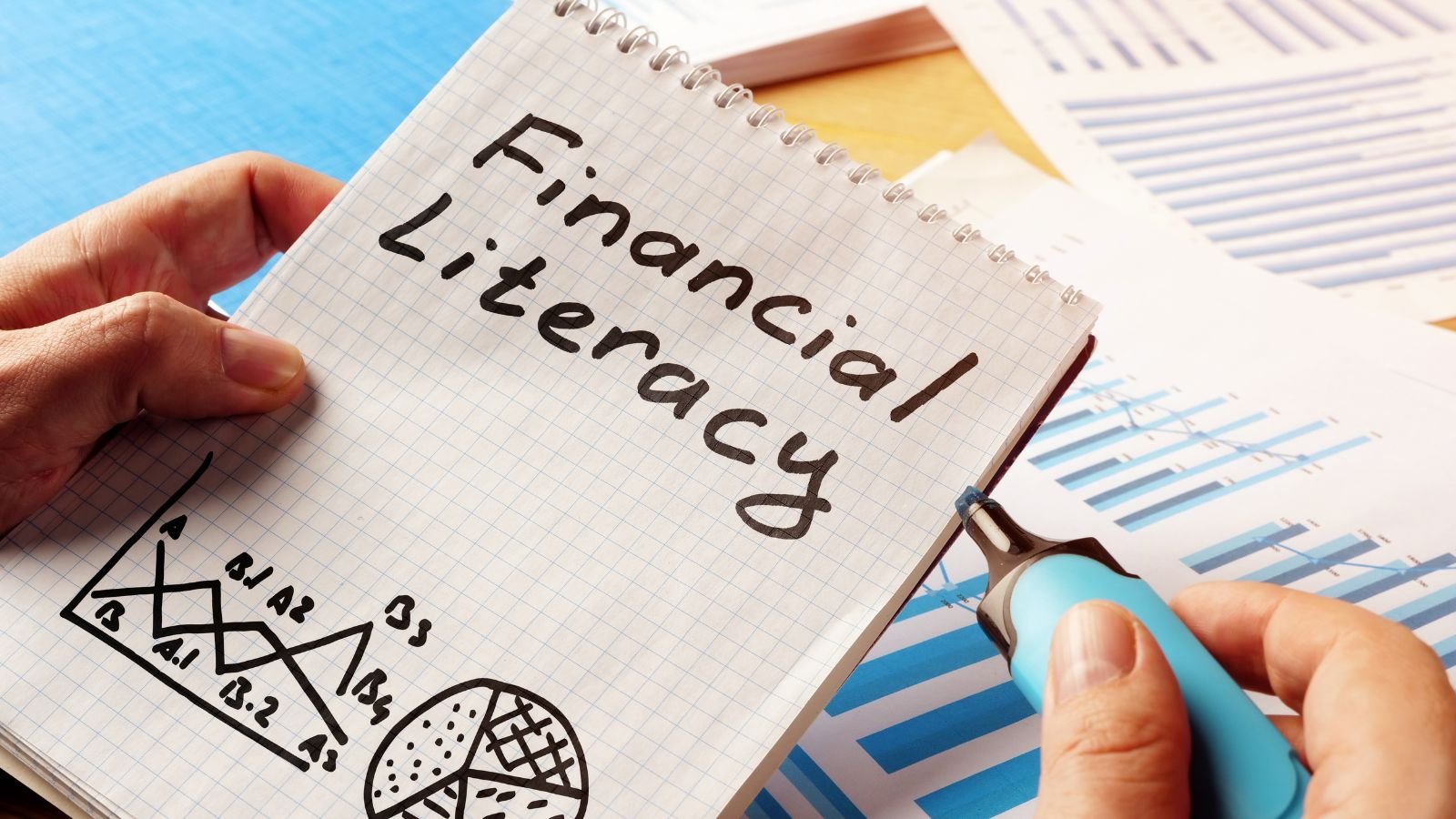Learning about money is crucial for taking charge of your life. Financial literacy teaches us how to handle our money well. It includes making budgets and choosing where to invest. Knowing how to manage money is key to a strong economy. It helps stop the cycle of poverty and builds a financially safe future.
Key Takeaways:
- Financial literacy empowers individuals to take control of their finances.
- It helps individuals manage their budget and make informed investment decisions.
- Financial literacy contributes to overall economic stability.
- It breaks the cycle of poverty and creates a foundation for a secure financial future.
- Financial literacy education is essential for personal empowerment and financial independence.
The Significance of Financial Literacy
Money is key to almost everything in our lives. Understandably, financial literacy is crucial. It lets us save wisely, invest for the future, and handle debt well. This leads to not only financial stability but also better living. It’s vital for fighting poverty and making smart choices in life, like picking the right college, buying a home, or planning for retirement.
Financial smarts go beyond just balancing a checkbook. They’re about laying a strong financial foundation for yourself and those you care about. In today’s world, knowing how to manage money is essential. It means you can control your financial fate and reach your aims.
Being financial literate is knowing how to deal with money matters. This includes budgeting, saving for surprises, planning for the future, and paying off debts right. Armed with these skills, people can make choices that reflect what’s important to them.
But, financial literacy isn’t just about individuals. It impacts our wider world too. Those who know their finances well can help their communities grow and stay strong. By choosing wisely with their money, they can increase wealth and open doors for everyone around them.
“Financial literacy is not an end in itself but a step towards personal empowerment and financial freedom.”
Education is the path to financial know-how. Teaching people about personal finance gives them the power to make smart choices. This is what financial literacy programs are all about. They help you understand and handle your money better.
Learning about money can happen in many ways. There are classes in school, online courses, workshops, and local programs. It doesn’t matter how old you are. It’s always a good time to start getting money smart. Plenty of help is out there, no matter where you’re coming from.
Benefits of Financial Literacy
Being money smart comes with many perks:
- It helps you make better choices with your money.
- You feel more confident about your finances.
- You’re better at setting and hitting your financial targets.
- Financial setbacks don’t hit you as hard.
- You understand more about banking and investing.
- You’re better prepared for when it’s time to retire.
Know-how is like a map for your finances. It shows you how to dodge money mistakes and grab chances for growth and success.
Learning about money is a journey that never really ends. It’s about always picking up new skills and info. No matter where you are in your financial learning path, there’s always more to discover. And this learning is what makes you stronger and more in control of your future.
| Financial Literacy Resources: | Description: |
|---|---|
| 1. Personal Finance Blogs | Explore blogs for great money advice and tips. |
| 2. Podcasts | Listen to expert podcasts on saving and managing money smartly. |
| 3. Books | Books by money gurus can help with your finances. |
| 4. Online Courses | Sign up for internet classes that cover money management and more. |
| 5. Financial Advisors | Get one-on-one advice from professional financial advisors for your financial success. |
Remember, learning about money is a way to invest in a better future for yourself. It puts you in charge of your financial story. And that’s a big step towards a life that’s more secure and fulfilling.
Challenges to Financial Literacy
Financial literacy levels are low around the world. Many people lack basic money know-how. This shows why we need comprehensive financial education programs. With the world going more digital, teaching about money faces both new challenges and chances.
Online banking and digital investment platforms have changed how we handle our funds. The ease and availability of these tools have made a big impact. But, they call for a new way to teach finances so everyone can manage both old-fashioned and new money ways.
The start of cryptocurrencies adds another twist. To get what this new digital money means for each of us, we need people who really understand it.
“The digital age has changed finance in big ways, bringing both hurdles and chances for better financial teaching. We need to create comprehensive financial education programs to prepare everyone for this constantly changing world.”
We must tackle these issues with comprehensive financial education programs. Such programs should include everything from basic money skills to smart investment tricks. When we teach people how to make clever choices with their money, we lift up financial literacy levels. This, in turn, helps people reach financial security and achieve their goals.

Financial Education Challenges
| Challenges | Opportunities |
|---|---|
| Low financial literacy levels | Improved educational programs |
| Rise of online banking | Convenient financial transactions |
| Digital investment platforms | Greater accessibility to investments |
| Emergence of cryptocurrencies | New financial possibilities and risks |
Celebrating Financial Literacy
April is Financial Literacy Month in the U.S. It’s a time for national efforts to share the importance of understanding money. The entire month is dedicated to making sure people have the knowledge they need for their financial future.
Many groups like organizations, schools, and the government work together this month. Their aim is to show everyone the benefits of knowing about money. They want to help people improve their money skills and learn more about finances.
Learning about money is important all year, though. It’s a journey you can continue through various ways. Things like blogs, books, and podcasts are great sources. You can attend seminars or workshops too. These teach you how to manage your money well.
The main aim is to empower people to make smart choices with their money. Financial knowledge helps you tackle money problems and prepares you for a stable future.
“Financial literacy is the bridge between dreams and reality. It empowers individuals by giving them the tools they need to make wise financial decisions and achieve their goals.” – John Smith, Financial Advisor
National efforts and education play a big role in boosting how well people understand money. By spreading the word about finances, these efforts help us all. So, everyone can become stronger financially and make better money choices. This also helps the country’s economy grow and stay steady.
Financial Literacy Initiatives Across the Nation
| Organization/Initiative | Description | Website |
|---|---|---|
| National Endowment for Financial Education (NEFE) | A nonprofit organization that offers comprehensive financial education programs and resources. | www.nefe.org |
| Jump$tart Coalition for Personal Financial Literacy | An alliance of organizations that work together to promote financial literacy in schools and communities. | www.jumpstart.org |
| MyMoney.gov | An initiative of the U.S. government providing a comprehensive online resource for financial education. | www.mymoney.gov |
These groups and more are working hard to improve how well we understand money in the U.S. Their combined efforts offer help to everyone, no matter where they come from. They provide important resources and support for better financial health.
Understanding money is key to taking charge of your finances. By getting involved in Financial Literacy Month, people can make real steps forward. They can get closer to their financial dreams and a safer future.
Empowering Through Knowledge
Learning about money helps people take charge of their finances. It teaches them practical skills and simplifies complicated money matters. This education allows folks to make choices that match their dreams and values.
Knowing about money makes individuals feel in control. It gives them the confidence to handle their own finances. They can prepare for the future, handle tough money times, and follow what they want in life.
Money education isn’t just about balancing a checkbook. It covers many areas like budgeting, saving, investing, credit, and smart choices. This knowledge lets people choose wisely, which helps them and their loved ones.
“Learning about money means more than crunching numbers. It’s giving people the power to confidently choose what matches their values and goals.” – Amy Johnson, Financial Education Expert
And it doesn’t stop with just one person. When someone understands money, their family and community benefit too. They lay a strong money foundation for their loved ones. They also help their community grow and keep the economy stable.
Let’s look at how learning about money helps different groups:
| Benefit | Financial Empowerment | Financial Decision-Making |
|---|---|---|
| Individuals | Increased confidence | Improved financial choices |
| Families | Stronger financial foundations | Enhanced financial well-being |
| Communities | Economic stability | Social empowerment |
Learning about money is important for personal and social progress. It empowers people with knowledge for a better, fairer tomorrow. Whether through school, self-learning, or getting advice, anyone can boost their money skills. This sets them up for a stronger financial future.
Conclusion
Financial literacy is a journey that never ends. It helps people manage their money well in any situation. Knowing how to budget, save, and invest wisely lets you make better choices with your money.
To get better at handling money, start by reading up on personal finance. There are many books, articles, and blogs that can help. You can also take classes or go to finance workshops and meet financial advisors. Connecting with friends who have similar money goals is also a great idea.
By always learning more about money and keeping up with the economy, you can live a more secure life. Financial smarts are not only good for you but also for your community’s well-being. They help you be in control of your financial future.
FAQ
What is financial literacy education?
Why is financial literacy important?
Why are financial literacy levels low globally?
What is Financial Literacy Month?
How can financial literacy empower individuals?
How can individuals improve their financial literacy skills?
Source Links
- https://www.forbes.com/sites/truetamplin/2023/09/21/financial-literacy–meaning-components-benefits–strategies/
- https://flourishwealthmanagement.com/resources/blog/financial-literacy-celebration-empowering-through-knowledge/
- https://www.investopedia.com/terms/f/financial-literacy.asp








GIPHY App Key not set. Please check settings